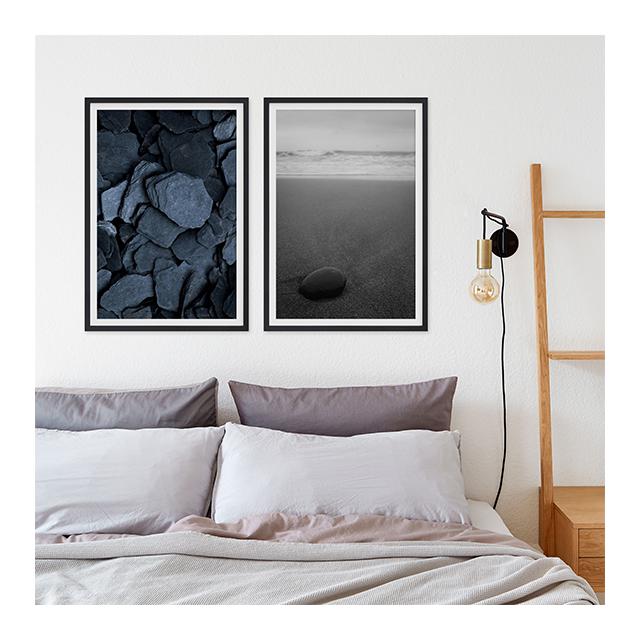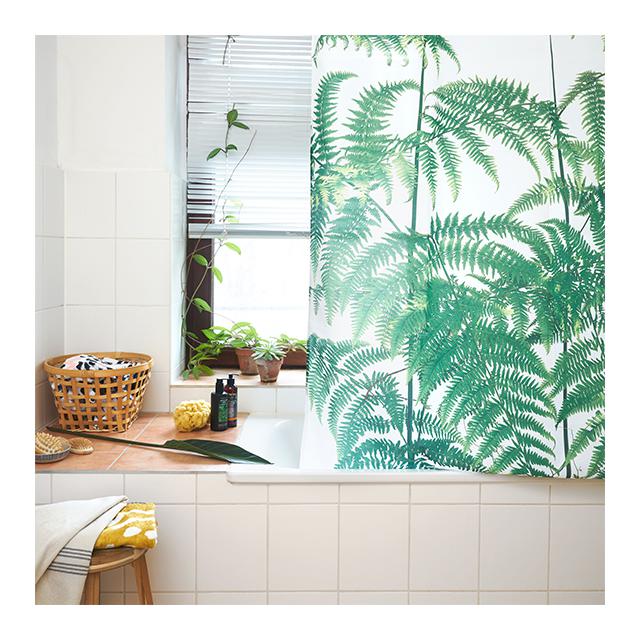The ancient Chinese philosophy of harmony, feng shui, relates to the invisible life energy of qi (pronounced ‘chi’). In the context of interiors, qi-oriented design practices are used to nourish health, happiness and hygge.
By applying the following décor tips to your bedroom, living room, or bathroom, you can dispel negative energies and encourage the circulation of positive qi within your home.

The bedroom: safely drift off into dreamland
The bedroom is the place where we spend most of our time in life, so it makes sense to furnish it in such a way that we are lulled into a blissful night’s sleep. Thus, feng shui recommends first and foremost the perfect placement of your bed. If possible, your headboard should always be up against a wall, without blocking the space between the bedroom door and windows. As a result, you will be able to lie back and keep watch over the entire room, sans fear of being greeted by unexpected surprises from behind.
As a general rule, visual chaos and distractions, such as blinking devices and piles of laundry, should be avoided in the bedroom. Good qi calls for order and tranquility; so keep the clutter out of sight and out of mind by utilising storage systems such as closets and closed shelving units. If you limit your décor to a capsule collection of aesthetically-pleasing furnishings, you will ensure that your surroundings and your inner spirit attain the desired level of peace. Another impactful design concept comprises natural materials, since the elements water, earth, metal, fire and wood are necessary for the uninhibited flow of feng shui. You can choose anything from wooden furniture, to brass lamps, to posters with stone motifs. In fact, stone and crystals have both physical and psychological healing effects which vary according to colouring and mineral composition.
Unsurprisingly, colours also play their part in feng shui’s channelling of qi. In particular, soft browns and sandy tones are said to have calming qualities in the bedroom. When coupled with paler shades of blue, known for their refreshing effect, such cool colour schemes optimise the aura of a room and work to subliminally induce a deep, regenerating sleep.

The living room: a space for conversation and relaxation
Whether you're looking to curl up on the sofa with a good book, or host a spirited get-together with friends and family members, the living room is the place for letting your hair down. Textiles, such as soft cushions with subtle nature motifs, add a layer of rest and recuperation—while cosy seating areas and round dining tables make for gatherings full of jovial interaction. Layout is equally essential here: sofas and seating areas should always be placed against the wall so that your guests can sit back, relax and let themselves go. As shown by the overriding preference for wall seats in bars and restaurants, most people prefer not to sit down with their back facing the door.
Those experienced in feng shui further advise that you utilise several smaller sources of light instead of one large ceiling lamp. In this way, various pools of light are created and the brightness spreads steadily and harmoniously throughout the room. The result is an even dissemination of positive qi.
Since nature and organic materials play a crucial role in feng shui practices, prints of forests, flowers or even mussels can help establish a pleasant living room ambience. Most of all, waterfalls, lakes and oceans symbolise the circulation of life and energy as well as regulating the flow of qi.
Wall art with crystalline motifs, such as cafelab’s rose quartz poster, also appeals to the symbolic, regenerative force of the natural elements. For example, aquamarine colours dispel built-up inner negativity, rubies strengthen the immune system, and amethysts improve concentration, while rose quartz enhances couples’ communication with one another.

The bathroom: wash away the worries of the day
In symbiosis with its neighbour, the bedroom, the bathroom is a place of individual ritual and inner retreat. As we wash away tangible blemishes and impurities, we simultaneously cleanse ourselves of the invisible stress and emotional baggage of everyday life. This will not have its full effect, however, unless we make sure to store belongings such as towels and cosmetics out of sight. Such cleanliness is as vital for inner peace in the bathroom as it is in the bedroom.
Water may be one of the five fundamental elements of feng shui, yet rooms in which moisture tends to build up easily are deemed to be detrimental to the flow of life energy. More specifically, the sink, toilet, shower and bathtub have too many openings through which qi can escape. In order to compensate for this energy loss, bathroom doors and toilet lids need to be kept closed.
Even in the bathroom, your choice of accessories makes a real difference; furnishings made from wood or stone, for example, work in harmony with the healing powers of nature and establish balanced levels of energy. To this end, feng shui experts similarly suggest that walls are painted in soft cream, beige and sand colours. When combined with tiles in terracotta tones and yellow decorative accents, such interior design should sustain a stable distribution of qi.
Final tip: something to avoid is the colour red. As it is associated with the element fire, red can inflame tensions vis-à-vis the prevailing element of the bathroom, water. Opt instead for shower curtains with botanical motifs or for green-coloured accessories, which act as a beautiful complement to the bluer hues and consolidate your feelings of freshness, serenity and well-being.
Text: Ina Schulze
Translation: Lucy Woods
Photo 1: Black Is the New Black + On the Horizon
Photo 2: Water 5 + Skogafoss Study 2
Photo 3: Flora - Adlerfarn